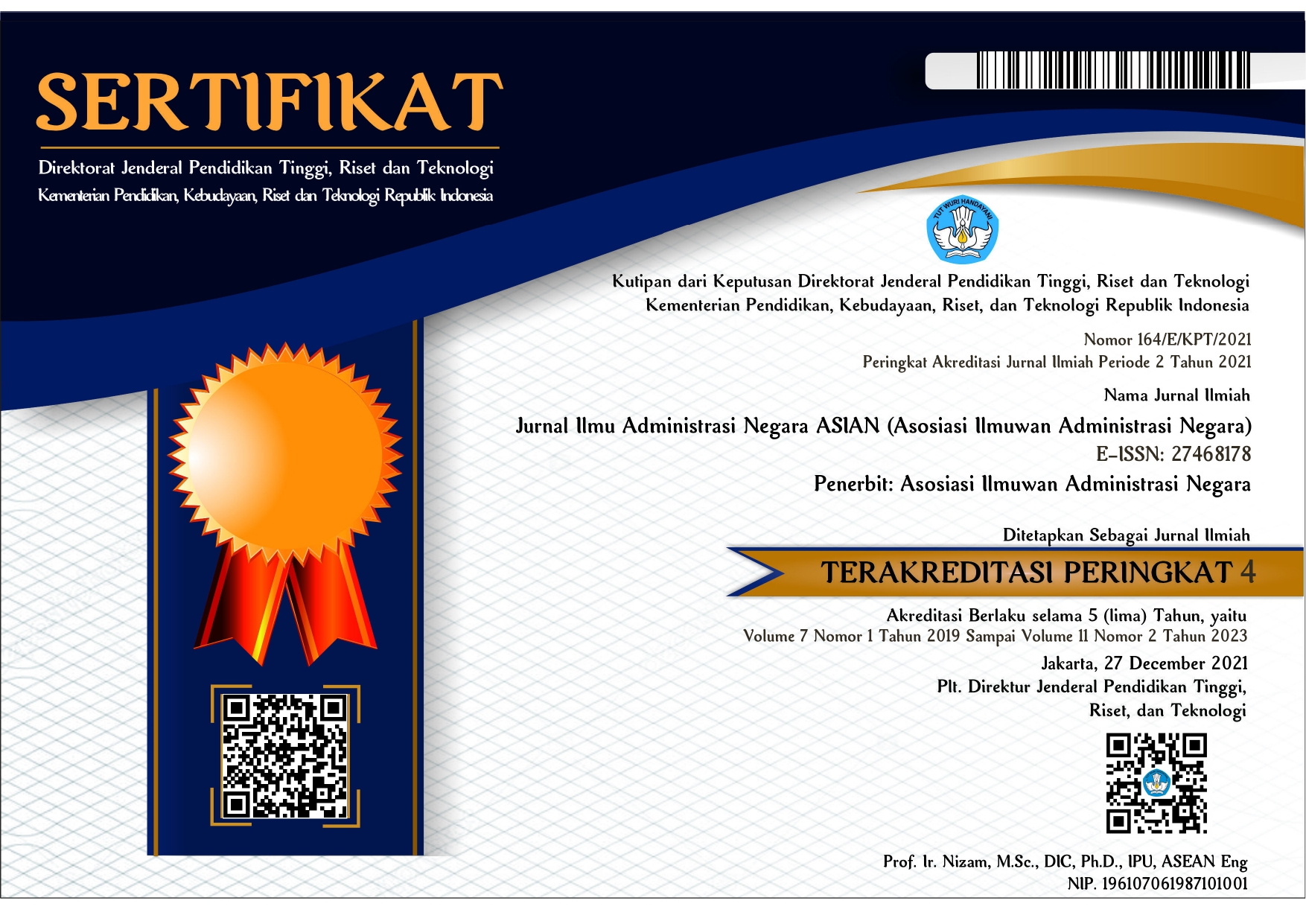Peran Kepemimpinan Kepala Desa dalam Pengembangan UMKM Desa Suwayuwo Kecamatan Sukorejo Kabupaten Pasuruan
 Abstract views: 535
,
Abstract views: 535
,
 PDF downloads: 558
PDF downloads: 558
Abstract
The role of village heads in developing MSMEs is very important because they have local authority to coordinate various programs and initiatives that support the growth of MSMEs in the region, such as providing guidance, connecting MSMEs with necessary resources, facilitating access to local and national markets, and promoting collaboration between MSMEs. By playing a proactive role, village heads can help improve the local economy and welfare of their community. This research aims to find out the leadership role of the Suwayuwo Villagei headi in the development of MSMEs. And to find out the obstacles the village head has in developing them. Thisiresearch uses aiqualitative descriptive method with data collection techniques through interviews,iobservation and documentation.iThe research results show that the village head in developing MSMEs in Suwayuwo Village has gone quite well, this is proven by holding training, and when there are events or meetings he always buys food products from MSMEs himself so that their merchandise continues to be stable and develop. Apart from that, the village head also took the initiative to utilize local potential in the village to develop MSMEs in the village. However, there are still obstacles in encouraging the development of MSMEs in Suwayuwo Village, such as budget limitations, the village funds received are very limited and must be divided for various village development needs, lack of facilities such as websites, and lack of NIB (Business Master Number) facilities for people who lack knowledge of technology.
Downloads
References
Hidayat, A. N. (2022). 4 Manfaat UMKM Bagi Masyarakat Dan Negara. Modal Rakyat. https://www.modalrakyat.id/blog/manfaat-umkm
Karimah. (2021). Strategi Penanggulangan Pengangguran melalui Peran Usaha Kecil Menengah (UKM) Genting. Ar-Ribhu, 2(1).
Miftah Thoha. (2015). Kepemimpinan dalam Manajemen. Rajawali Pers.
Moloeng, L. . . (2000). Metodologi Penelitian Kualitatif.
Nurcholis, H. (2007). Teori dan Praktik Pemerintahan dan Otonomi Daerah. PT Grasindo.
Puspa. (2020). Pengaruh Kompetensi Pemerintah Desa, Sistem Pengendalian Internal dan Aksesibilitas Laporan Keuangan terhadap Akuntabilitas Pengelolaan Dana Desa. Media Riset Akuntansi, Auditing & Informasi, 20(2), 281–298. file:///C:/Users/WINDOWS 10/Downloads/4648-14487-1-PB.pdf
Rahma, N. (2024). Pemberdayaan UMKM dalam Meningkatkan Kemandirian Masyarakat. Jurnal Masyarakat Mandiri, 8(3), 2526. https://journal.ummat.ac.id/index.php/jmm/article/view/22339/pdf
Roza. (2017). Peran Badan Permusyawaratan Desa di Dalam Pembangunan Desa dan Pengawasan Keuangan Desa. PADJADJARAN; Jurnal Ilmu Hukum, 4(3), 606–624.
Salam. (2022). Peran Pemerintah Daerah dalam Pengembangan UMKM. Kebijakan Publik, 13, 137–143.
Siagian. (2018). Manajemen Sumber Daya Manusia. Bumi Aksara.
Soekarso. (2010). Teori Kepemimpinan. Mitra Wacana Media.
Sudana, N. (2021). Pengembangan Desa Kreatif melalui Implementasi Program Kampus Merdeka Belajar dan Hilirisasi Research. Sinergi Pemberdayaan Masyarakat, 9, 235–248.
Sumadi. (2021). Peran Pemerintah Daerah dalam Pengembangan Usaha Mikro Kecil Menengah “Handycraft” Limbah Kayu Jati sebagai Produk Unggulan Kabupaten Bojonegoro. Sintax Literate: Jurnal Ilmiah Indonesia, 5(6), 137–143.
Tokan. (2020). Studi tentang Kepemimpinan Kepala Desa dalam Melaksanakan Kewenangan Desa menuju Kemandirian Desa di Kecamatan Witihama Kabupaten Flores Timur. Warta Governare: Jurnal Ilmu Pemerintahan, 1(1), 90–108.
Wibowo, et. al. (2022). Peran Pemerintah Daerah dalam Pengembangan UMKM (Kampung Batik) di Kecamatan Sukun Malang. Sadeli: Pengabdian Kepada Masyarakat, 2, 1–7.
Wirawan. (2013). Kepemimpinan. Raja Grafindo Persada.
Copyright (c) 2024 Jurnal Ilmu Administrasi Negara ASIAN (Asosiasi Ilmuwan Administrasi Negara)

This work is licensed under a Creative Commons Attribution-ShareAlike 4.0 International License.
Authors who publish with this journal agree to the following terms:
1. Copyright on any article is retained by the author(s).
2. The author grants the journal, right of first publication with the work simultaneously licensed under a Creative Commons Attribution License that allows others to share the work with an acknowledgment of the work’s authorship and initial publication in this journal.
3. Authors are able to enter into separate, additional contractual arrangements for the non-exclusive distribution of the journal’s published version of the work (e.g., post it to an institutional repository or publish it in a book), with an acknowledgment of its initial publication in this journal.
4. Authors are permitted and encouraged to post their work online (e.g., in institutional repositories or on their website) prior to and during the submission process, as it can lead to productive exchanges, as well as earlier and greater citation of published work.
5. The article and any associated published material is distributed under the Creative Commons Attribution-ShareAlike 4.0 International License








